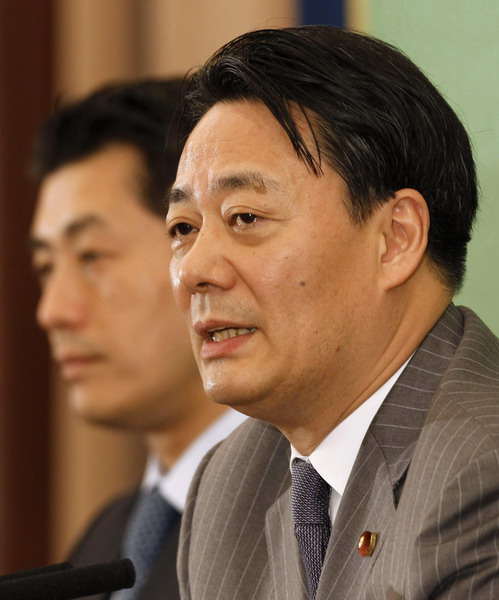Latest News
Japan to unveil nuclear operator Tepco compensation scheme
(Agencies)
Updated: 2011-05-12 10:53
 |
Large Medium Small |
TOKYO - Japan's government is expected to unveil a scheme on Thursday that includes a $62 billion fund injection to help Tokyo Electric Power compensate victims of the crisis at its tsunami-crippled nuclear plant and save Asia's largest utility from financial ruin.
|
 Japan's Trade Minister Banri Kaieda (R) speaks next to Goshi Hosono, advisor to the Prime Minister, during a news conference at the Japan National Press Club in Tokyo May 11, 2011. Japan's Trade Minister Kaieda said he was aiming for cabinet approval this week of a government-backed scheme to help Tokyo Electric Power pay for damages caused by the crisis at its Fukushima Daiichi nuclear plant. [Photo/Agencies] |
| ||||
The utility is still struggling to get reactors at its Fukushima Daiichi plant, damaged by the massive March 11 earthquake and tsunami, under control two months after the disaster.
The plan, which culminates weeks of wrangling among government officials, bankers and Tokyo Electric executives over who should foot the bill for the crisis at the nuclear plant, was expected to relieve the worst fears of financial markets but could come under fire from Kan's critics as a politically driven bailout of the utility.
Tokyo Electric and creditor banks have pushed for hefty state aid, warning that problems at Japan's largest corporate bond issuer - accounting for 8 percent of the 70 trillion yen corporate bond market - could destabilise financial markets.
Many politicians and bureaucrats, however, have pressed to hold shareholders and management accountable for the crisis.
"I think this might be criticised ... from both the left and the right," said Sophia University professor Koichi Nakano.
"People who are more sympathetic to Tepco and the banks, and worry about the economic repercussions of overburdening Tepco, would be critical of the government for being populist with harsh conditions.
"On the other hand, there are those who are critical of Tepco and the way the government is perceived as being too lenient on the company and shareholders. It's a controversial issue," he said, but added that legislation needed for the scheme was likely to pass parliament.
Bondholders breathe easier
The government does not plan to put a limit on Tokyo Electric's liabilities, but it will ask other nuclear plant operators to help fund the scheme with premiums that could also serve as insurance for future nuclear accidents.
"I'm sure this scheme has especially relieved bondholders. It has also relieved shareholders to some extent on views that Tepco will not go bankrupt," said Ryosuke Okazaki, chief investment officer at ITC Investment Partners.
"Tepco's bond spreads are expected to stablise, but Tepco shares could come under pressure. In addition, this scheme is expected to increase uncertainty for other power utility companies," he added.
The government will inject 5 trillion yen ($62 billion) worth of special-purpose bonds into the fund. The bonds can be turned into cash to handle the initial burst of payouts to residents who evacuated the plant's vicinity and others due compensation, allowing Tokyo Electric and other utilities to spread their burden over several years.
In one government simulation, if compensation totals 5 trillion yen, Tokyo Electric would be asked to pay back 200 billion yen to the fund annually over 13 years, with the rest to be shouldered by the other utilities.
While stock and bond holders are in principle to be protected under the scheme, one lawmaker with knowledge of the plan said on Wednesday that it would be a decade before the utility, known for its healthy dividends, paid a dividend again.
Tokyo Electric said on Wednesday that it had accepted conditions set by the government in return for state assistance, including additional restructuring and unlimited liability in paying compensation to crisis victims. [ID:nL3E7GA099]
Kyodo news agency said the government would ask Tokyo Electric to secure 1 trillion yen in funds through asset sales and streamlining in the first year of the scheme.
Tokyo Electric likely made a net loss of more than 1 trillion yen in the year that ended on March 31, the biggest ever for a non-financial Japanese firm, after booking costs to scrap four damaged nuclear reactors and writing off tax assets, the Nikkei newspaper reported on Wednesday.
Tokyo Electric will finalise its accounts for the year ended in March once the scheme is officially approved, and an executive said its annual earnings report would be released on May 20. The report has been delayed due to uncertainty over its liabilities and how it will finance compensation.
| 分享按钮 |
